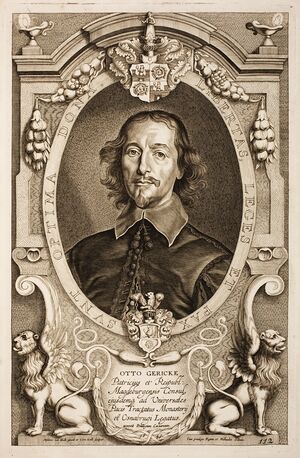Otto von Guericke (nonfiction): Difference between revisions
(Created page with "'''Otto von Guericke''' (originally spelled Gericke, German pronunciation: [ˈɡeːʁɪkə]) (November 20, 1602 – May 11, 1686 (Julian calendar); November 30, 1602 – May 2...") |
No edit summary |
||
| Line 1: | Line 1: | ||
'''Otto von Guericke''' (originally spelled Gericke, German pronunciation: [ˈɡeːʁɪkə]) (November 20, 1602 – May 11, 1686 (Julian calendar); November 30, 1602 – May 21, 1686 (Gregorian calendar)) was a German scientist, inventor, and politician. His major scientific achievements were the establishment of the physics of vacuums, the discovery of an experimental method for clearly demonstrating electrostatic repulsion, and his advocacy of the reality of "action at a distance" and of "absolute space". | [[File:Otto_von_Guericke.jpg|thumb|Otto von Guericke.]]'''Otto von Guericke''' (originally spelled Gericke, German pronunciation: [ˈɡeːʁɪkə]) (November 20, 1602 – May 11, 1686 (Julian calendar); November 30, 1602 – May 21, 1686 (Gregorian calendar)) was a German scientist, inventor, and politician. His major scientific achievements were the establishment of the physics of vacuums, the discovery of an experimental method for clearly demonstrating electrostatic repulsion, and his advocacy of the reality of "action at a distance" and of "absolute space". | ||
He embarked upon his magnum opus — ''Ottonis de Guericke Experimenta Nova (ut vocantur) Magdeburgica de Vacuo Spatio'' — which as well as a detailed account of his experiments on the vacuum, contains his pioneering electrostatic experiments in which electrostatic repulsion was demonstrated for the first time and sets out his theologically based view of the nature of space. In the Preface to the Reader he claims to have finished the book on March 14, 1663, though publication was delayed for another nine years until 1672. | He embarked upon his magnum opus — ''Ottonis de Guericke Experimenta Nova (ut vocantur) Magdeburgica de Vacuo Spatio'' — which as well as a detailed account of his experiments on the vacuum, contains his pioneering electrostatic experiments in which electrostatic repulsion was demonstrated for the first time and sets out his theologically based view of the nature of space. In the Preface to the Reader he claims to have finished the book on March 14, 1663, though publication was delayed for another nine years until 1672. | ||
Revision as of 17:14, 10 February 2017
Otto von Guericke (originally spelled Gericke, German pronunciation: [ˈɡeːʁɪkə]) (November 20, 1602 – May 11, 1686 (Julian calendar); November 30, 1602 – May 21, 1686 (Gregorian calendar)) was a German scientist, inventor, and politician. His major scientific achievements were the establishment of the physics of vacuums, the discovery of an experimental method for clearly demonstrating electrostatic repulsion, and his advocacy of the reality of "action at a distance" and of "absolute space".
He embarked upon his magnum opus — Ottonis de Guericke Experimenta Nova (ut vocantur) Magdeburgica de Vacuo Spatio — which as well as a detailed account of his experiments on the vacuum, contains his pioneering electrostatic experiments in which electrostatic repulsion was demonstrated for the first time and sets out his theologically based view of the nature of space. In the Preface to the Reader he claims to have finished the book on March 14, 1663, though publication was delayed for another nine years until 1672.
In the News
Fiction cross-reference
Nonfiction cross-reference
External links:
- Otto von Guericke @ Wikipedia
Attribution:
